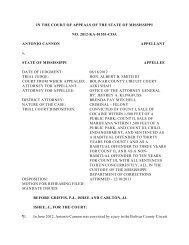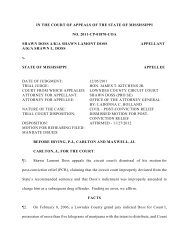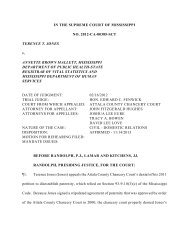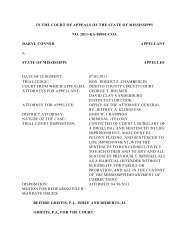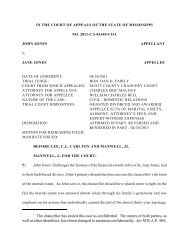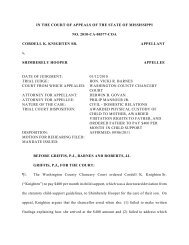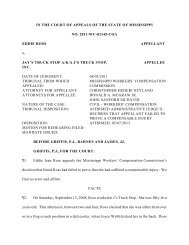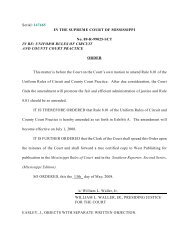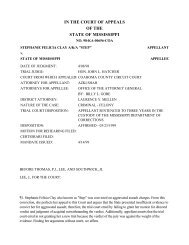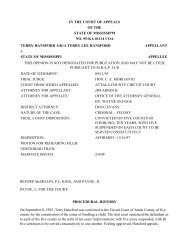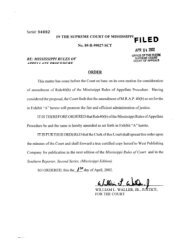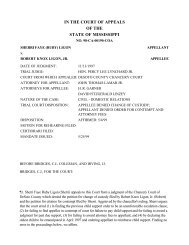in the court of appeals of the state of mississippi no. 94-ka-00661 ...
in the court of appeals of the state of mississippi no. 94-ka-00661 ...
in the court of appeals of the state of mississippi no. 94-ka-00661 ...
Create successful ePaper yourself
Turn your PDF publications into a flip-book with our unique Google optimized e-Paper software.
IN THE COURT OF APPEALS<br />
OF THE<br />
STATE OF MISSISSIPPI<br />
NO. <strong>94</strong>-KA-<strong>00661</strong> COA<br />
ANTHONY DORRIS, A/K/A "TONY" DORRIS,<br />
A/K/A ANTHONY EUGENE DORRIS<br />
v.<br />
STATE OF MISSISSIPPI<br />
APPELLANT<br />
APPELLEE<br />
THIS OPINION IS NOT DESIGNATED FOR PUBLICATION AND MAY NOT BE CITED,<br />
PURSUANT TO M.R.A.P. 35-B<br />
DATE OF JUDGMENT: 9/6/91<br />
TRIAL JUDGE:<br />
COURT FROM WHICH APPEALED:<br />
ATTORNEY FOR APPELLANT:<br />
ATTORNEY FOR APPELLEE:<br />
DISTRICT ATTORNEY:<br />
NATURE OF THE CASE:<br />
TRIAL COURT DISPOSITION:<br />
HON. ELZY J. SMITH<br />
CIRCUIT COURT OF TUNICA COUNTY<br />
ALLAN D. SHACKELFORD<br />
OFFICE OF THE ATTORNEY GENERAL<br />
BY: PAT FLYNN<br />
LAURENCE Y. MELLEN<br />
CRIMINAL - FELONY<br />
DISPOSITION: AFFIRMED - 10/21/97<br />
MOTION FOR REHEARING FILED:<br />
CERTIORARI FILED:<br />
MANDATE ISSUED: 11/12/97<br />
GUILTY - MANSLAUGHTER, SENTENCED<br />
TO TERM OF 12 YEARS IN AN<br />
INSTITUTION UNDER THE SUPERVISION<br />
OF THE MISSISSIPPI DEPARTMENT OF<br />
CORRECTIONS, WHICH SENTENCE IS TO<br />
RUN CONSECUTIVELY TO ANY AND ALL<br />
SENTENCES PREVIOUSLY IMPOSED<br />
BEFORE THOMAS, P.J., COLEMAN, AND KING, JJ.<br />
COLEMAN, J., FOR THE COURT:<br />
A grand jury <strong>in</strong>dicted <strong>the</strong> appellant, Anthony Dorris, for <strong>the</strong> crime <strong>of</strong> murder <strong>in</strong> <strong>the</strong> death <strong>of</strong> Charles<br />
Ray Cook, but a jury <strong>in</strong> <strong>the</strong> Circuit Court <strong>of</strong> Tunica County returned a verdict <strong>of</strong> "guilty <strong>of</strong><br />
manslaughter." Pursuant to that verdict, <strong>the</strong> circuit judge entered a judgment <strong>of</strong> Dorris' guilt <strong>of</strong> <strong>the</strong><br />
crime <strong>of</strong> manslaughter and sentenced him to serve a term <strong>of</strong> twelve years <strong>in</strong> an <strong>in</strong>stitution under <strong>the</strong>
supervision and control <strong>of</strong> <strong>the</strong> Mississippi Department <strong>of</strong> Corrections, which sentence is to run<br />
consecutively to any and all sentences previously imposed. Dorris <strong>appeals</strong> from this judgment to<br />
argue that his conviction was aga<strong>in</strong>st <strong>the</strong> overwhelm<strong>in</strong>g weight <strong>of</strong> <strong>the</strong> evidence; never<strong>the</strong>less, this<br />
Court affirms <strong>the</strong> trial <strong>court</strong>'s judgment and sentence.<br />
I. FACTS<br />
On Saturday, June 28, 1991, Charles Ray Cook and three companions were participat<strong>in</strong>g <strong>in</strong> a<br />
barbeque contest, or "cook-<strong>of</strong>f," conducted at Nelw<strong>in</strong> Camp, which is located on Tunica Cut-<strong>of</strong>f <strong>in</strong><br />
Tunica County. Cook and his companions had rented <strong>the</strong> location where <strong>the</strong>y were to cook for $75,<br />
and Tammy Everett, one <strong>of</strong> Cook's companions engaged <strong>in</strong> <strong>the</strong> contest, had pa<strong>in</strong>ted <strong>the</strong> boundaries <strong>of</strong><br />
<strong>the</strong>ir assigned area <strong>in</strong> <strong>the</strong> grass with red spray-pa<strong>in</strong>t. Cook's group was cook<strong>in</strong>g pork shoulders, a<br />
task which required some eight to ten hours to complete. The judg<strong>in</strong>g was to beg<strong>in</strong> at <strong>no</strong>on on that<br />
day, so Cook's group had arrived at around n<strong>in</strong>e o'clock <strong>the</strong> night before to beg<strong>in</strong> <strong>the</strong>ir preparation<br />
for <strong>the</strong> contest.<br />
On that same Friday even<strong>in</strong>g, Dorris and his bro<strong>the</strong>r-<strong>in</strong>-law, Terry Roland, had driven <strong>in</strong> Dorris'<br />
mo<strong>the</strong>r's car from Dorris' home <strong>in</strong> Memphis to Tunica Cut-<strong>of</strong>f for a weekend fish<strong>in</strong>g trip. Dorris and<br />
Roland planned to stay <strong>in</strong> his family's trailer which was located at Bordeaux Po<strong>in</strong>t, a<strong>no</strong><strong>the</strong>r camp<br />
located <strong>in</strong> <strong>the</strong> Cut-<strong>of</strong>f. Attached beh<strong>in</strong>d <strong>the</strong>ir car was a trailer on which <strong>the</strong>y were haul<strong>in</strong>g <strong>the</strong>ir fish<strong>in</strong>g<br />
boat. On <strong>the</strong> floorboard <strong>of</strong> <strong>the</strong> car was a fish<strong>in</strong>g knife with a three-<strong>in</strong>ch blade that Dorris used to open<br />
<strong>the</strong> car's hood and trunk. Once Dorris and Roland had arrived at his family's trailer, Dorris opened <strong>the</strong><br />
car's trunk with <strong>the</strong> fish<strong>in</strong>g knife preparatory to his unhook<strong>in</strong>g <strong>the</strong> boat trailer and disconnect<strong>in</strong>g <strong>the</strong><br />
wires for <strong>the</strong> trailer's lights from <strong>the</strong> car. After Dorris had opened <strong>the</strong> trunk with <strong>the</strong> knife, he put <strong>the</strong><br />
knife <strong>in</strong> his rear pants pocket.<br />
Dorris and Roland also brought a half-gallon conta<strong>in</strong>er <strong>of</strong> Jim Beam whiskey with <strong>the</strong>m. Once <strong>the</strong>y<br />
had unhooked <strong>the</strong> boat trailer from <strong>the</strong> car and Dorris had changed his shirt, Roland and Dorris went<br />
to Rico's, a bar located <strong>in</strong> <strong>the</strong> Bordeaux Camp. After <strong>the</strong>y had played pool and had been dr<strong>in</strong>k<strong>in</strong>g for<br />
about an hour and a half at Rico's, Dorris and Roland left Rico's and went to K<strong>in</strong>gston's, a bait shop<br />
and bar located <strong>in</strong> Nelw<strong>in</strong> Camp, <strong>the</strong> site <strong>of</strong> <strong>the</strong> barbeque cook-<strong>of</strong>f.<br />
At about three o'clock on Saturday morn<strong>in</strong>g, June 28, Dorris left K<strong>in</strong>gston's and walked over to <strong>the</strong><br />
area assigned to Cook and his companions to barbeque. There he began to socialize with some <strong>of</strong> <strong>the</strong><br />
contestants and <strong>the</strong>ir guests. A fight erupted between Dorris and Charles Ray Cook, <strong>the</strong> consequence<br />
<strong>of</strong> which was Dorris' nearly sever<strong>in</strong>g Cook's eye brow from his face and stabb<strong>in</strong>g Cook one time <strong>in</strong><br />
<strong>the</strong> chest with his fish<strong>in</strong>g knife. Tammy Everett and Frank Johnston placed Cook, gasp<strong>in</strong>g and<br />
convuls<strong>in</strong>g, <strong>in</strong> <strong>the</strong> bed <strong>of</strong> Cook's pick-up and drove him to <strong>the</strong> hospital <strong>in</strong> Tunica, where <strong>the</strong>y met a<br />
helicopter which flew Cook to a trauma center <strong>in</strong> Memphis. Cook died en route.<br />
Immediately after he stabbed Cook, Dorris returned to K<strong>in</strong>gston's, where he tried to persuade his<br />
bro<strong>the</strong>r-<strong>in</strong>-law to leave with him. After Dorris and Roland went outside, a scuffle ensued among<br />
Dorris and some <strong>of</strong> Cook's companions, <strong>in</strong>clud<strong>in</strong>g James Chambers, who were try<strong>in</strong>g to get <strong>the</strong><br />
numbers on <strong>the</strong> license plate <strong>of</strong> Dorris' car before he left. After <strong>the</strong> scuffle, Dorris sped away without<br />
Roland <strong>in</strong>to <strong>the</strong> Delta summer night.<br />
The next day Tunica County Deputy Sheriff Jessie Powell went to <strong>the</strong> Cut-<strong>of</strong>f to <strong>in</strong>vestigate <strong>the</strong> fight
etween Dorris and Cook. When he arrived at <strong>the</strong> Cut-<strong>of</strong>f, Powell obta<strong>in</strong>ed a description <strong>of</strong> Dorris'<br />
car and a partial description <strong>of</strong> Dorris. As Deputy Powell returned to Tunica on Highway 61, <strong>the</strong><br />
dispatcher for <strong>the</strong> Tunica County Sheriff's Office called Powell to advise him that a subject who<br />
matched Dorris' partial description had been seen walk<strong>in</strong>g <strong>no</strong>rth toward Memphis on Highway 61.<br />
About two miles <strong>no</strong>rth <strong>of</strong> Rob<strong>in</strong>sonville, <strong>the</strong> deputy saw Dorris walk<strong>in</strong>g toward Memphis on <strong>the</strong> east<br />
side <strong>of</strong> <strong>the</strong> highway. He stopped to <strong>in</strong>terrogate Dorris and subsequently arrested him.<br />
The three categories <strong>of</strong> competition <strong>in</strong> <strong>the</strong> barbeque cook-<strong>of</strong>f were shoulders, ribs, and wild game.<br />
Cook's team won <strong>the</strong> category for barbequ<strong>in</strong>g shoulders.<br />
II. TRIAL<br />
Pursuant to <strong>the</strong> grand jury's <strong>in</strong>dictment <strong>of</strong> Dorris for <strong>the</strong> murder <strong>of</strong> Cook on August 6, 1991, Dorris<br />
was tried on Monday, which was Labor Day, and Tuesday, <strong>the</strong> second and third days <strong>of</strong> September,<br />
1991. Dorris' only issue is that "[t]he verdict <strong>of</strong> <strong>the</strong> jury is aga<strong>in</strong>st <strong>the</strong> overwhelm<strong>in</strong>g weight <strong>of</strong> <strong>the</strong><br />
evidence." Dorris argues that <strong>the</strong> evidence overwhelm<strong>in</strong>gly demonstrated that he acted <strong>in</strong> self-defense<br />
because it was reasonable for him to believe that Cook, who was <strong>the</strong> aggressor from his perspective,<br />
was armed with a knife when Cook approached him and began fight<strong>in</strong>g. Thus, we review <strong>in</strong> detail <strong>the</strong><br />
witnesses' testimony about whe<strong>the</strong>r Cook was <strong>the</strong> aggressor and whe<strong>the</strong>r Cook may have been armed<br />
with a knife when <strong>the</strong> fight between Dorris and him began. As with most trials where <strong>the</strong>re are<br />
several witnesses, <strong>the</strong> details are murky and contradictory. The clarity <strong>of</strong> testimony was sullied by all<br />
<strong>the</strong> witnesses' admissions that everybody <strong>in</strong>volved <strong>in</strong> this escapade had been dr<strong>in</strong>k<strong>in</strong>g beer and/or<br />
whiskey and were <strong>in</strong>toxicated to some degree.<br />
The State's first witness was Carolyn Cook, widow <strong>of</strong> Charles Ray Cook, who testified that<br />
Claiborne, Louisiana, had been her late husband's family's home. However, her husband, a carpenter<br />
and self-employed contractor, had been liv<strong>in</strong>g <strong>in</strong> a camp<strong>in</strong>g trailer <strong>in</strong> <strong>the</strong> Tunica Cut-<strong>of</strong>f for <strong>the</strong> two<br />
years which preceded his death while he built apartments and did remodel<strong>in</strong>g jobs <strong>in</strong> <strong>the</strong> Tunica area.<br />
She described her husband as be<strong>in</strong>g five feet, ten <strong>in</strong>ches tall, and weigh<strong>in</strong>g "probably 145, maybe 150<br />
pounds."<br />
James D. Chambers was <strong>the</strong> State's second witness. Chambers testified that th<strong>in</strong>gs began to happen<br />
around three o'clock Saturday morn<strong>in</strong>g when Dorris walked to Cook's designated barbequ<strong>in</strong>g area<br />
and began visit<strong>in</strong>g with <strong>the</strong> contestants and <strong>the</strong>ir guests. Tammy Everett asked Chambers to ask<br />
Dorris to leave, but Dorris replied that Cook's group had <strong>no</strong> right to ask him to leave. Everett <strong>the</strong>n<br />
expla<strong>in</strong>ed to Dorris <strong>the</strong> red boundary, after which Dorris voluntarily stepped across it. However,<br />
Dorris cont<strong>in</strong>ued to stand just across <strong>the</strong> boundary outside Cook's designated cook<strong>in</strong>g area.<br />
Chambers had been sitt<strong>in</strong>g on a cooler situated just under <strong>the</strong> edge <strong>of</strong> <strong>the</strong> pavilion next to <strong>the</strong> cook<strong>in</strong>g<br />
area while he talked to Kenny Bol<strong>in</strong>g and Tammy Scarborough. Chambers looked up just <strong>in</strong> time to<br />
see Cook and Dorris "head up," to use Chamber's language. Chambers had last seen Cook stand<strong>in</strong>g<br />
next to <strong>the</strong> cooker which was located near <strong>the</strong> center <strong>of</strong> <strong>the</strong> designated area. David Chambers, who<br />
was James Chambers' little bro<strong>the</strong>r, had been stand<strong>in</strong>g with Cook at <strong>the</strong> cooker before <strong>the</strong> fight<br />
began.<br />
Chambers got up and walked toward <strong>the</strong> fight to break it up. As he approached <strong>the</strong> combatants,<br />
Cook stumbled backward toward him, went around him "<strong>in</strong> almost a semi-circle, and fell to <strong>the</strong><br />
ground." As Cook fell, he hit his head on <strong>the</strong> corner <strong>of</strong> a bench to a picnic table, which was out from
under <strong>the</strong> ro<strong>of</strong> <strong>of</strong> <strong>the</strong> pavilion. When Chambers <strong>no</strong>ticed that Cook was "bleed<strong>in</strong>g real bad" across his<br />
face and that "<strong>the</strong>re was blood all over his shirt," he said, "Call 911." Dorris had retreated to <strong>the</strong><br />
stairs lead<strong>in</strong>g up to K<strong>in</strong>gston's bar when Chambers went <strong>in</strong>side to call 911. Chambers testified that as<br />
he ascended <strong>the</strong> stairs past Dorris to enter K<strong>in</strong>gston's, Dorris brandished a knife and told him,<br />
Chambers, "to stay <strong>the</strong> hell away from him [Dorris]." Once <strong>in</strong>side, he found that Kenny Bol<strong>in</strong>g was<br />
already on <strong>the</strong> phone. Chambers did <strong>no</strong>t see Dorris stab Cook, <strong>no</strong>r did he k<strong>no</strong>w what precipitated <strong>the</strong><br />
fight.<br />
The State asked Chambers, "At <strong>the</strong> time that you saw Charles Ray on <strong>the</strong> ground, was <strong>the</strong>re a knife<br />
anywhere near him that you saw?" Chambers replied, "Not on <strong>the</strong> ground." He <strong>the</strong>n testified that he<br />
had <strong>no</strong>t seen anyth<strong>in</strong>g <strong>in</strong> Cook's hands dur<strong>in</strong>g his fight with Dorris. On cross-exam<strong>in</strong>ation, Chambers<br />
testified that he did <strong>no</strong>t k<strong>no</strong>w whe<strong>the</strong>r Cook carried a knife and that he had <strong>no</strong>t seen Cook hand a<br />
sharpen<strong>in</strong>g stone to Tammy Everett as Cook approached Dorris. Chambers also testified on crossexam<strong>in</strong>ation<br />
that he did <strong>no</strong>t hear Cook threaten Dorris.<br />
The State's third witness, Tammy Scarborough, testified that she saw Dorris strike Tammy Everett<br />
before <strong>the</strong> fight between Dorris and Cook erupted. She did <strong>no</strong>t see with what he struck her. Cook<br />
was wear<strong>in</strong>g glasses before his fight with Dorris. Scarborough testified that she saw Cook hand<br />
someone his glasses before he approached Dorris. The next th<strong>in</strong>g she knew, Dorris and Cook were<br />
fight<strong>in</strong>g. Then she saw Cook, who was bleed<strong>in</strong>g, throw his hands up. She saw <strong>no</strong>th<strong>in</strong>g <strong>in</strong> Cook's<br />
hands dur<strong>in</strong>g <strong>the</strong> fight. Scarborough went <strong>in</strong>to K<strong>in</strong>gston's and asked <strong>the</strong> woman who worked <strong>the</strong>re to<br />
call 911. Scarborough testified that she did <strong>no</strong>t see Cook make any threaten<strong>in</strong>g or assaultive gestures<br />
as he approached Dorris and that she did <strong>no</strong>t hear Cook say anyth<strong>in</strong>g to Dorris <strong>of</strong> a threaten<strong>in</strong>g<br />
nature. All Scarborough heard before <strong>the</strong> fight began was Cook's ask<strong>in</strong>g Dorris, "[P]lease leave so <strong>no</strong><br />
trouble would be started." When <strong>the</strong> prosecutor asked her, "Did you ever see <strong>the</strong> knife that even<strong>in</strong>g?"<br />
Scarborough answered, "No, Sir."<br />
On cross-exam<strong>in</strong>ation, Scarborough testified that she had first seen Dorris earlier that night <strong>in</strong><br />
K<strong>in</strong>gston's when he bought her and her unidentified friend a beer. Scarborough did <strong>no</strong>t k<strong>no</strong>w whe<strong>the</strong>r<br />
Cook carried a knife. Scarborough pr<strong>of</strong>essed to k<strong>no</strong>w that Cook had been <strong>in</strong> a lot <strong>of</strong> fights, but she<br />
asserted that Cook was try<strong>in</strong>g "<strong>no</strong>t to get <strong>in</strong> a fight." On redirect exam<strong>in</strong>ation, <strong>the</strong> prosecutor asked,<br />
"Was [Cook] do<strong>in</strong>g anyth<strong>in</strong>g aggressive this night when this th<strong>in</strong>g happened?" Scarborough<br />
answered, "No." When <strong>the</strong> prosecutor <strong>in</strong>quired, "Did [Cook] threaten [Dorris] <strong>in</strong> any way that you<br />
saw or heard?" Scarborough replied, "No."<br />
Frank D. Johnston was <strong>the</strong> State's fourth witness. As had Scarborough, Johnston had first seen<br />
Dorris <strong>in</strong>side K<strong>in</strong>gston's earlier that night. Then, around 3:00 a.m. Dorris came over to where Cook's<br />
group was cook<strong>in</strong>g and began to bicker with some <strong>of</strong> <strong>the</strong> people who were present. Johnson, who<br />
was busy prepar<strong>in</strong>g <strong>the</strong> fire and gett<strong>in</strong>g everyth<strong>in</strong>g ready to beg<strong>in</strong> cook<strong>in</strong>g, had <strong>no</strong>t paid very much<br />
attention to Dorris. Just before <strong>the</strong> confrontation began, Johnston decided to move his truck. Thus,<br />
he was <strong>in</strong>side his truck when Dorris and Cook began fight<strong>in</strong>g. From <strong>in</strong>side his truck, Johnston saw<br />
that "Charles Ray went at him . . . after <strong>the</strong> conflict with Tammy."<br />
The prosecutor asked Johnston, "When [Cook] was on <strong>the</strong> ground <strong>the</strong>re, did you see any knife or any<br />
weapon <strong>in</strong> his hand?" Johnston replied, "No." On cross-exam<strong>in</strong>ation, Johnston <strong>state</strong>d that <strong>the</strong> first<br />
time he saw Dorris that night was when he met him <strong>in</strong> <strong>the</strong> park<strong>in</strong>g lot <strong>of</strong> K<strong>in</strong>gston's where Dorris was
talk<strong>in</strong>g to some <strong>of</strong> Johnston's friends. When Dorris' counsel asked Johnston if he knew whe<strong>the</strong>r Cook<br />
carried a knife, Johnston responded, "He always did. He used it <strong>in</strong> work everyday . . . . It was just a<br />
habit." Johnston fur<strong>the</strong>r testified that he had heard Dorris brag before <strong>the</strong> fight began that "[t]here<br />
wasn't a son <strong>of</strong> a bitch out <strong>the</strong>re big e<strong>no</strong>ugh to make him leave." Johnston added that Dorris had been<br />
flirt<strong>in</strong>g with both Tammy Everett and Tammy Scarborough and that Everett did <strong>no</strong>t appreciate it. At<br />
that moment James Chambers asked Dorris to leave. On redirect exam<strong>in</strong>ation, Johnston reiterated<br />
that he never saw Cook pull a knife. However, he established that Cook had a knife <strong>in</strong> his back<br />
pocket that he had used earlier that even<strong>in</strong>g to cut up <strong>the</strong> meat for cook<strong>in</strong>g. He reiterated that he<br />
never saw Cook assume <strong>the</strong> roll <strong>of</strong> aggressor toward Dorris that night.<br />
Kenneth Bol<strong>in</strong>g, Jr. was <strong>the</strong> State's fifth witness. He testified that he observed Dorris and Cook<br />
sw<strong>in</strong>g<strong>in</strong>g at each o<strong>the</strong>r for three or four blows before Cook staggered, but he too never saw any<br />
knife, whe<strong>the</strong>r wielded by Dorris or by Cook. On cross-exam<strong>in</strong>ation, Bol<strong>in</strong>g <strong>state</strong>d that he had never<br />
seen Cook with a knife. He also testified that he had seen Dorris put his hand <strong>in</strong> his back pocket one<br />
time when he was stand<strong>in</strong>g across <strong>the</strong> red l<strong>in</strong>e before <strong>the</strong> fight began. About Cook's glasses which he<br />
had been wear<strong>in</strong>g before <strong>the</strong> fight, Bol<strong>in</strong>g testified that he believed that Cook had taken <strong>of</strong>f his<br />
glasses and put <strong>the</strong>m down before he approached Dorris.<br />
Tammy Everett, <strong>the</strong> State's sixth witness, testified that a few m<strong>in</strong>utes after Dorris had arrived at <strong>the</strong>ir<br />
cook<strong>in</strong>g area, he began to make comments that were "sexual" and "<strong>no</strong>t really wanted at <strong>the</strong> time."<br />
Accord<strong>in</strong>g to Everett, she was <strong>the</strong> first person to ask Dorris to leave. Then, James Chambers, David<br />
Chambers, and Charles Ray Cook each asked Dorris to leave. Next, Everett expla<strong>in</strong>ed to Dorris that<br />
<strong>the</strong>y had rented <strong>the</strong> area with<strong>in</strong> <strong>the</strong> red l<strong>in</strong>es for $75 and that he was <strong>no</strong>t welcome. Only <strong>the</strong>n did<br />
Dorris cross <strong>the</strong> l<strong>in</strong>e, but after he had crossed it, Dorris <strong>state</strong>d, aga<strong>in</strong> accord<strong>in</strong>g to Everett, that <strong>the</strong><br />
first person who crossed <strong>the</strong> l<strong>in</strong>e to his side was a dead person.<br />
After Dorris crossed <strong>the</strong> red l<strong>in</strong>e, Everett walked over to Cook and James Chambers to ask if ei<strong>the</strong>r<br />
<strong>of</strong> <strong>the</strong>m wanted a beer. Everett testified that <strong>the</strong> next th<strong>in</strong>g she knew, Dorris hit her underneath her<br />
eye. Dorris's blow cut Everett just beneath her eye. Everett testified that after Dorris struck her,<br />
Cook got between Dorris and her, and <strong>the</strong> fight began. She saw Cook stumble backward and heard<br />
him say, "I've been cut." Everett expla<strong>in</strong>ed that she had <strong>no</strong>t seen Dorris stab Cook because she bent<br />
down after Dorris' blow had hurt her eye. Everett did <strong>no</strong>t k<strong>no</strong>w whe<strong>the</strong>r Cook had removed his<br />
glasses before he approached Dorris. When <strong>the</strong> prosecutor asked Everett if she saw anyth<strong>in</strong>g happen<br />
which would require Dorris to defend himself, she replied, "No, Sir, I did <strong>no</strong>t." On crossexam<strong>in</strong>ation,<br />
Everett testified that she never saw a knife.<br />
After <strong>the</strong> State called <strong>the</strong> paramedic who treated Cook at <strong>the</strong> hospital <strong>in</strong> Tunica and Jessie Powell,<br />
<strong>the</strong> deputy sheriff who had arrested Dorris <strong>the</strong> next day, it <strong>the</strong>n called David Chambers. David<br />
Chambers testified that because his bro<strong>the</strong>r James had <strong>in</strong>vited Dorris over to Cook's companions, <strong>the</strong><br />
group asked James to ask Dorris to leave. David testified that after Dorris had jo<strong>in</strong>ed <strong>the</strong> group, he<br />
became cocky and began to brag about his knife wounds from earlier bar fights. He testified that he<br />
saw Dorris strike Everett and that Dorris was hold<strong>in</strong>g an object <strong>in</strong> <strong>the</strong> hand with which he struck<br />
Everett. David Chambers told <strong>the</strong> jury that he had seen Cook approach Dorris and Dorris <strong>the</strong>n stab<br />
Cook. Chambers described Cook's approach to Dorris as "a moderate walk<strong>in</strong>g toward [him]." To<br />
quote David Chambers' testimony: "He [Cook] wasn't runn<strong>in</strong>g. He wasn't scream<strong>in</strong>g at him. He<br />
wasn't yell<strong>in</strong>g, and he didn't have his fists drawn back or anyth<strong>in</strong>g. He was just walk<strong>in</strong>g towards him."
David Chambers testified that he had seen Cook with a beer can <strong>in</strong> his hand, but that he never saw<br />
Cook with a knife before Dorris stabbed him. Chambers saw Cook "hugged up" to Dorris. Then he<br />
saw Cook get a couple <strong>of</strong> licks <strong>in</strong>to Dorris' back after Dorris had stabbed him but before he began to<br />
stumble back. Chambers helped Frank Johnston put Cook <strong>in</strong> <strong>the</strong> bed <strong>of</strong> Cook's truck after <strong>the</strong> fight<br />
had ended. The State rested after David Chamber's testimony.<br />
Dorris testified as <strong>the</strong> only witness on his behalf. He testified that he had first met James Chambers at<br />
Rico's. When he and Roland went to K<strong>in</strong>gston's, Dorris saw James Chambers for <strong>the</strong> second time that<br />
even<strong>in</strong>g. As he left K<strong>in</strong>gston's with James Chambers around midnight, <strong>the</strong>y encountered Cook, Frank<br />
Johnston, and o<strong>the</strong>rs <strong>in</strong> K<strong>in</strong>gston's park<strong>in</strong>g lot. Chambers <strong>in</strong>troduced him to Cook and <strong>the</strong> o<strong>the</strong>rs<br />
<strong>the</strong>re <strong>in</strong> <strong>the</strong> park<strong>in</strong>g lot. Dorris and Roland <strong>the</strong>n returned to K<strong>in</strong>gston's, where <strong>the</strong>y resumed dr<strong>in</strong>k<strong>in</strong>g<br />
<strong>the</strong>ir Jim Beam. Accord<strong>in</strong>g to Dorris, his bro<strong>the</strong>r-<strong>in</strong>-law and he "had almost done f<strong>in</strong>ished (sic) [<strong>the</strong><br />
half-gallon <strong>of</strong> Jim Beam]" when Roland "got so drunk he couldn't even talk to me <strong>no</strong> more (sic)."<br />
Dorris eventually walked outside <strong>of</strong> K<strong>in</strong>gston's, looked over to where Cook's team was prepar<strong>in</strong>g to<br />
barbeque, and saw James Chambers. Dorris "casually walked over and sat down" and began to<br />
engage <strong>in</strong> casual conversation with <strong>the</strong> barbequers and <strong>the</strong>ir guests.<br />
Dorris' version <strong>of</strong> <strong>the</strong> events which led up to his stabb<strong>in</strong>g Cook was <strong>no</strong>t very dissimilar from <strong>the</strong><br />
accounts <strong>of</strong> Cook's companions; however, he emphatically denied that he ever struck Tammy<br />
Everett, whom he described as be<strong>in</strong>g "real bad <strong>in</strong> <strong>the</strong> mouth" with a "really bad attitude." The record<br />
conta<strong>in</strong>s Dorris' version <strong>of</strong> what transpired dur<strong>in</strong>g his fight with Cook, which we quote:<br />
A. And <strong>the</strong>n I looked over at Charles Ray, and he was tak<strong>in</strong>g <strong>of</strong>f his glasses. So I said, "I k<strong>no</strong>w<br />
this man is fix<strong>in</strong>g to jump on me." So he started -- he turned around and took his right hand and<br />
[put it] beh<strong>in</strong>d him, and I thought he was fix<strong>in</strong>g to stick his hand <strong>in</strong> his back pocket, and I<br />
already knew that he had a knife because he had . . .<br />
Q. How did you k<strong>no</strong>w that he had a knife?<br />
A. Because he had a sharpen<strong>in</strong>g rock. Because earlier <strong>the</strong> little pocket knife that <strong>the</strong>y was --<br />
said that <strong>the</strong>y was pok<strong>in</strong>g <strong>the</strong> meat with, Tammy Everett was sitt<strong>in</strong>g <strong>the</strong>re sharpen<strong>in</strong>g it, and she<br />
asked him for his sharpen<strong>in</strong>g rock. So he took his sharpen<strong>in</strong>g rock out <strong>of</strong> his pocket and handed<br />
it to her.<br />
Dorris next testified:<br />
I figured that he had had a weapon. You k<strong>no</strong>w, that I knew he had a knife <strong>of</strong> some k<strong>in</strong>d 'cause<br />
when he was stand<strong>in</strong>g <strong>the</strong>re and he was walk<strong>in</strong>g towards me, he never took his right hand out<br />
from beh<strong>in</strong>d him. I could <strong>no</strong>t see his hand. I could <strong>no</strong>t -- I didn't -- I can<strong>no</strong>t say that I seen a<br />
knife. All I did was presume that he had a knife <strong>in</strong> his hand.<br />
Dorris expla<strong>in</strong>ed that Cook took <strong>of</strong>f his glasses as he approached Dorris and that Cook reached for<br />
him when he got close e<strong>no</strong>ugh to do it. When Cook reached for Dorris, Dorris hit Cook; <strong>the</strong>n both<br />
combatants began sw<strong>in</strong>g<strong>in</strong>g at each o<strong>the</strong>r. Dorris "k<strong>in</strong>d <strong>of</strong> [fell] back on one knee" and caught himself<br />
with his left hand on <strong>the</strong> ground. Dorris next testified that when he came back up, Cook was fall<strong>in</strong>g<br />
back, stepp<strong>in</strong>g away from him. When Dorris saw "everybody start<strong>in</strong>g to swarm <strong>in</strong> that place," he<br />
"took <strong>of</strong>f runn<strong>in</strong>g." Dorris told <strong>the</strong> jury <strong>in</strong> his direct testimony that he had taken his knife out <strong>of</strong> his
pocket when Cook was "walk<strong>in</strong>g towards him with his hand beh<strong>in</strong>d his back."<br />
After <strong>the</strong> circuit <strong>court</strong> entered its judgment <strong>of</strong> Dorris' guilt <strong>of</strong> manslaughter and its sentence <strong>of</strong> twelve<br />
years, Dorris' <strong>court</strong>-appo<strong>in</strong>ted counsel failed to perfect an appeal from that judgment to <strong>the</strong><br />
Mississippi Supreme Court. Dorris' present appeal resulted from <strong>the</strong> trial judge's grant<strong>in</strong>g him an out<br />
<strong>of</strong> time appeal by an order rendered on June 9, 19<strong>94</strong>, <strong>in</strong> response to Dorris' motion for an out <strong>of</strong> time<br />
appeal and o<strong>the</strong>r relief.<br />
III. REVIEW, ANALYSIS, AND RESOLUTION OF THE ISSUE<br />
We quote Anthony Dorris's one issue verbatim from his brief: "The verdict <strong>of</strong> <strong>the</strong> jury is aga<strong>in</strong>st <strong>the</strong><br />
overwhelm<strong>in</strong>g weight <strong>of</strong> <strong>the</strong> evidence."<br />
A. STANDARD OF REVIEW<br />
Dorris does <strong>no</strong>t dispute <strong>the</strong> legal sufficiency <strong>of</strong> <strong>the</strong> State's evidence. Instead, Dorris contends only<br />
that <strong>the</strong> trial <strong>court</strong> erred <strong>in</strong> deny<strong>in</strong>g his motion for a new trial. It is with<strong>in</strong> <strong>the</strong> trial <strong>court</strong>'s discretion<br />
whe<strong>the</strong>r to grant a motion for a new trial. Jones v. State, 635 So. 2d 884, 887 (Miss. 19<strong>94</strong>). This<br />
motion is <strong>no</strong>t considered de <strong>no</strong>vo on review. Veal v. State, 585 So. 2d 693, 695 (Miss. 1991). The<br />
Mississippi Supreme Court will only reverse where it f<strong>in</strong>ds that <strong>the</strong>re has been an abuse <strong>of</strong> discretion.<br />
Wetz v. State, 503 So. 2d 803, 812 (Miss. 1987); Catch<strong>in</strong>gs v. State, 684 So. 2d 591, 600 (Miss.<br />
1996). The Mississippi Supreme Court will overturn <strong>the</strong> trial <strong>court</strong>'s denial <strong>of</strong> a motion for a new trial<br />
only where it is "conv<strong>in</strong>ced that <strong>the</strong> verdict is so contrary to <strong>the</strong> overwhelm<strong>in</strong>g weight <strong>of</strong> <strong>the</strong> evidence<br />
that, to allow it to stand, would be to sanction an unconscionable <strong>in</strong>justice." Groseclose v. State, 440<br />
So. 2d 297, 300 (Miss. 1983); May v. State, 460 So. 2d 778, 781-2 (Miss. 1984). See e.g., Wetz, 503<br />
So. 2d at 812; Taylor v. State, 672 So. 2d 1246, 1256 (Miss. 1996). The Mississippi Supreme Court's<br />
standard <strong>of</strong> review perforce becomes this Court's standard <strong>of</strong> review.<br />
B. SELF-DEFENSE<br />
In every crim<strong>in</strong>al case, <strong>the</strong> State bears <strong>the</strong> burden <strong>of</strong> prov<strong>in</strong>g each element <strong>of</strong> <strong>the</strong> <strong>of</strong>fense charged<br />
beyond a reasonable doubt. Heidel v. State, 587 So. 2d 835, 843 (Miss. 1991). The law does <strong>no</strong>t<br />
require that a defendant prove his conduct was <strong>in</strong> self-defense <strong>in</strong> order to obta<strong>in</strong> a verdict <strong>of</strong><br />
acquittal. Heidel, 587 So. 2d at 843. Instead, "[I]f a reasonable doubt <strong>of</strong> his guilt arises from <strong>the</strong><br />
evidence . . . he must be acquitted." Id. (citations omitted). Dorris admitted that he stabbed Cook, but<br />
he claimed that his tak<strong>in</strong>g Cook's life was justified because he did so <strong>in</strong> self-defense. As a result, <strong>the</strong><br />
only real dispute is whe<strong>the</strong>r Dorris's evidence <strong>of</strong> self-defense was so strong that it precluded any<br />
decision by <strong>the</strong> jury o<strong>the</strong>r than acquittal. Kelly v. State, 463 So. 2d 1070, 1075 (Miss. 1985).<br />
Section 97-3-15(1)(f) <strong>of</strong> <strong>the</strong> Mississippi Code <strong>state</strong>s:<br />
(1) The kill<strong>in</strong>g <strong>of</strong> a human be<strong>in</strong>g by <strong>the</strong> act, procurement, or omission <strong>of</strong> a<strong>no</strong><strong>the</strong>r shall be<br />
justifiable <strong>in</strong> <strong>the</strong> follow<strong>in</strong>g cases:<br />
. . . .<br />
(f) When committed <strong>in</strong> <strong>the</strong> lawful defense <strong>of</strong> one's own person . . . where <strong>the</strong>re shall be<br />
reasonable ground to apprehend a design to commit a felony or to do some great personal
<strong>in</strong>jury, and <strong>the</strong>re shall be imm<strong>in</strong>ent danger <strong>of</strong> such design be<strong>in</strong>g accomplished . . . .<br />
Miss. Code Ann. § 97-3-15(1)(f) (Rev. 19<strong>94</strong>).<br />
Fear <strong>of</strong> impend<strong>in</strong>g death or great bodily harm does <strong>no</strong>t automatically entitle one person to kill<br />
a<strong>no</strong><strong>the</strong>r. No person is privileged to use more force than is reasonably necessary to protect himself. As<br />
<strong>the</strong> Mississippi Supreme Court expla<strong>in</strong>ed <strong>in</strong> Stennis v. State, 234 So. 2d 611, 614 (Miss. 1970):<br />
[W]here a person repels an assault with a deadly weapon, he acts at his own peril and <strong>the</strong><br />
question <strong>of</strong> whe<strong>the</strong>r he was justified <strong>in</strong> us<strong>in</strong>g <strong>the</strong> weapon is for determ<strong>in</strong>ation by a jury unless<br />
<strong>the</strong>re is <strong>no</strong> reasonable <strong>in</strong>ference <strong>in</strong> <strong>the</strong> evidence except that <strong>the</strong> use <strong>of</strong> <strong>the</strong> deadly weapon<br />
appeared necessary to protect <strong>the</strong> person from death or great bodily harm at <strong>the</strong> hands <strong>of</strong> his<br />
assailant.<br />
In Scott v. State, 203 Miss. 349, 353, 34 So. 2d 718, 719 (1<strong>94</strong>8), a case which Dorris contends is<br />
factually analogous to <strong>the</strong> case sub judice and thus supports his argument on this issue, <strong>the</strong><br />
Mississippi Supreme Court held that <strong>in</strong> order to justify <strong>the</strong> defense <strong>of</strong> self-defense, <strong>the</strong> danger faced<br />
by <strong>the</strong> actor "need <strong>no</strong>t be actual, but only reasonably apparent and imm<strong>in</strong>ent." In Scott, <strong>the</strong><br />
Mississippi Supreme Court <strong>in</strong>dicated that "reasonable grounds to apprehend" con<strong>no</strong>tes "apparent<br />
danger." 203 Miss. at 354, 34 So. 2d at 719. Fur<strong>the</strong>r, Scott def<strong>in</strong>es "apparent danger" as an "overt<br />
demonstration, by conduct and acts, <strong>of</strong> a design to take life or do some personal <strong>in</strong>jury, as would<br />
make <strong>the</strong> kill<strong>in</strong>g reasonably necessary to self-preservation or to escape great bodily harm." Id. at 353,<br />
34 So. 2d at 719. The law will allow a person to act based upon "reasonable appearances" and allows<br />
<strong>the</strong> danger to be ei<strong>the</strong>r actual or apparent. Id. at 354, 34 So. 2d at 719.<br />
Never<strong>the</strong>less, <strong>in</strong> Hart v. State, 637 So. 2d 1329, 1339 (Miss. 19<strong>94</strong>), <strong>the</strong> Mississippi Supreme Court<br />
expla<strong>in</strong>ed:<br />
In order to justify kill<strong>in</strong>g a<strong>no</strong><strong>the</strong>r <strong>in</strong> self-defense, <strong>the</strong> actor's apprehension <strong>of</strong> danger must be<br />
"objectively" reasonable. That is to say, <strong>the</strong> apprehension <strong>of</strong> danger that would justify a kill<strong>in</strong>g<br />
<strong>of</strong> a<strong>no</strong><strong>the</strong>r on <strong>the</strong> ground <strong>of</strong> self-defense must be real and such as would or should, under <strong>the</strong><br />
circumstances, be enterta<strong>in</strong>ed by a reasonably well-disposed man <strong>of</strong> average prudence.<br />
(citations omitted).<br />
The fact that <strong>the</strong> defendant believes that a m<strong>in</strong>or assault will be committed aga<strong>in</strong>st him is <strong>no</strong>t e<strong>no</strong>ugh<br />
to support a claim <strong>of</strong> self-defense. Stennis, 234 So. 2d at 614.<br />
C. WEIGHT OF THE EVIDENCE<br />
In Scott, on which Dorris relies, <strong>the</strong> deceased started an unprovoked argument with <strong>the</strong> defendant.<br />
Scott, 203 Miss. at 349, 34 So. 2d at 718. Next, <strong>the</strong> decedent followed <strong>the</strong> defendant Scott to<br />
a<strong>no</strong><strong>the</strong>r group, only to restart <strong>the</strong>ir disagreement. The decedent <strong>state</strong>d that he was go<strong>in</strong>g to get his<br />
gun to kill <strong>the</strong> defendant and left <strong>in</strong> a drunken rage. Unbek<strong>no</strong>wnst to <strong>the</strong> defendant, <strong>the</strong> decedent<br />
drove straight to Albert Jones's house to retrieve <strong>the</strong> gun he had left <strong>the</strong>re earlier. In an effort to seek<br />
assistance and protection from <strong>the</strong> decedent, <strong>the</strong> defendant also went to Albert Jones' home. Id.<br />
Upon see<strong>in</strong>g <strong>the</strong> defendant, <strong>the</strong> decedent shouted that he <strong>in</strong>tended to kill <strong>the</strong> defendant. Id. at 352, 34<br />
So. 2d at 719. When <strong>the</strong> decedent reached <strong>in</strong>to his overalls, Scott assumed that decedent was go<strong>in</strong>g
to pull out a weapon. Id. The supreme <strong>court</strong> reversed Scott's conviction and remanded <strong>the</strong> case for a<br />
new trial because it found that Scott's assumption that <strong>the</strong> decedent was about to pull a weapon was<br />
reasonable and was fully supported by <strong>the</strong> evidence. Id. at 354, 34 So. 2d at 720.<br />
However, this Court f<strong>in</strong>ds that Anthony Dorris' situation was <strong>no</strong>t analogous to Scott's circumstances.<br />
Dorris' bass for believ<strong>in</strong>g that Cook was armed was his hav<strong>in</strong>g seen Cook hand Tammy Everett a<br />
sharpen<strong>in</strong>g stone and Cook's approach<strong>in</strong>g him with Cook's hand beh<strong>in</strong>d his back. Dorris admitted<br />
from <strong>the</strong> stand that he could <strong>no</strong>t say that he had seen a knife and that "all [he] did was presume that<br />
[Cook] had a knife <strong>in</strong> his hand." Unlike <strong>the</strong> decedent <strong>in</strong> Scott, Cook never threatened to get a<br />
weapon. 203 Miss. at 352, 34 So. 2d at 718. No witness saw Cook with a knife <strong>in</strong> his hand before <strong>the</strong><br />
fight between <strong>the</strong> two men began. No witness, <strong>no</strong>t even Dorris, testified that Cook threatened to kill<br />
or to harm Dorris before <strong>the</strong> fight erupted.<br />
The case sub judice is more analogous to Russell v. State, 497 So. 2d 75 (Miss. 1986). In Russell,<br />
<strong>the</strong> Mississippi Supreme Court rejected <strong>the</strong> defendant's claim that his conviction <strong>of</strong> murder was<br />
unsupported by <strong>the</strong> evidence <strong>in</strong> light <strong>of</strong> his claim <strong>of</strong> self-defense. 497 So. 2d at 76. The supreme <strong>court</strong><br />
found that Russell's conviction was supported by evidence that <strong>the</strong> victim was unarmed and that he<br />
was stabbed after <strong>the</strong> defendant threatened to kill him. Id. In <strong>the</strong> case sub judice, <strong>the</strong>re is <strong>no</strong> evidence<br />
that Charles Ray Cook was armed with a knife or any o<strong>the</strong>r weapon when he was killed, and<br />
accord<strong>in</strong>g to some <strong>of</strong> <strong>the</strong> State's witnesses, Dorris had threatened to kill anyone who crossed <strong>the</strong> red<br />
boundary l<strong>in</strong>e. Dorris admitted under oath that he never saw a knife <strong>in</strong> Cook's hand. Dorris must at<br />
least demonstrate that Cook acted <strong>in</strong> such a way that it was reasonable for him to believe that Cook<br />
had a weapon. Scott, 203 Miss. at 353-4, 34 So. 2d at 720. True, Frank Johnston testified that Cook<br />
habitually carried a pocket knife which he rout<strong>in</strong>ely used <strong>in</strong> his contract<strong>in</strong>g and construction bus<strong>in</strong>ess,<br />
but Dorris did <strong>no</strong>t testify that he knew this fact.<br />
The evidence that Dorris acted <strong>in</strong> self-defense was that he presumed that Cook had a knife because<br />
he saw Cook hand a sharpen<strong>in</strong>g stone to Tammy Everett and that Cook approached Dorris with his<br />
hand beh<strong>in</strong>d his back so that Dorris could <strong>no</strong>t see what Cook had <strong>in</strong> it. The evidence <strong>in</strong> <strong>the</strong> case sub<br />
judice clearly presented an issue for <strong>the</strong> jury to decide. Where <strong>the</strong> testimony <strong>of</strong> witnesses conflict, <strong>the</strong><br />
jury is ultimately responsible for mak<strong>in</strong>g f<strong>in</strong>d<strong>in</strong>gs <strong>of</strong> fact and weight<strong>in</strong>g witness credibility. Wetz, 503<br />
So. 2d at 812; Dixon v. State, 519 So. 2d 1226, 1228 (Miss. 1988). The jury's discretion <strong>in</strong> choos<strong>in</strong>g<br />
whe<strong>the</strong>r to accept all or part <strong>of</strong> a witness's testimony is unfettered. Meshell v. State, 506 So. 2d 989,<br />
992 (Miss. 1987). On appeal, <strong>the</strong> appellate <strong>court</strong> does <strong>no</strong>t reevaluate <strong>the</strong> jury's verdict or f<strong>in</strong>d<strong>in</strong>gs <strong>of</strong><br />
fact. Veal, 585 So. 2d at 695. All that is necessary for <strong>the</strong> appellate <strong>court</strong> to uphold <strong>the</strong> verdict <strong>of</strong> <strong>the</strong><br />
jury is for <strong>the</strong>re to have been a factual dispute presented to <strong>the</strong> jury for determ<strong>in</strong>ation. Groseclose,<br />
440 So. 2d at 300. Especially under <strong>the</strong> rationale <strong>of</strong> Russell v. State, this Court has <strong>no</strong> difficulty <strong>in</strong><br />
affirm<strong>in</strong>g <strong>the</strong> trial <strong>court</strong>'s judgment <strong>of</strong> Dorris' guilt and <strong>the</strong> sentence which <strong>the</strong> trial <strong>court</strong> imposed on<br />
him. 497 So. 2d at 76. Thus, this Court does <strong>no</strong>t sanction an unconscionable <strong>in</strong>justice by uphold<strong>in</strong>g<br />
<strong>the</strong> jury's verdict that Dorris was guilty <strong>of</strong> manslaughter. The trial <strong>court</strong>'s judgment and sentence are<br />
affirmed.<br />
THE TUNICA COUNTY CIRCUIT COURT'S JUDGMENT OF APPELLANT'S GUILT OF<br />
MANSLAUGHTER AND ITS SENTENCE OF APPELLANT TO SERVE TWELVE YEARS<br />
IN AN INSTITUTION UNDER THE SUPERVISION AND CONTROL OF THE<br />
MISSISSIPPI DEPARTMENT OF CORRECTIONS TO RUN CONSECUTIVELY TO ANY
AND ALL SENTENCES PREVIOUSLY IMPOSED ARE AFFIRMED. COSTS OF THIS<br />
APPEAL ARE ASSESSED TO TUNICA COUNTY.<br />
BRIDGES, C.J., McMILLIN AND THOMAS, P.JJ., DIAZ, HERRING, HINKEBEIN, KING,<br />
PAYNE, AND SOUTHWICK, JJ., CONCUR.



